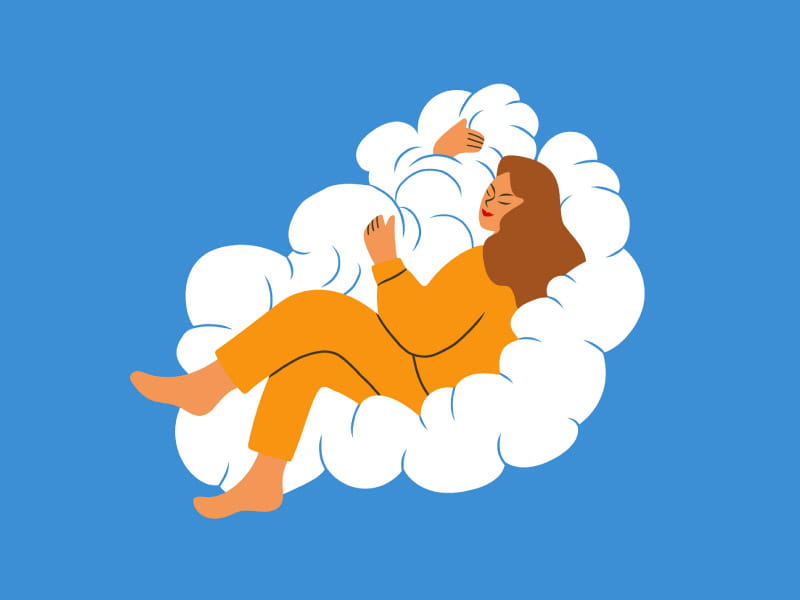Can sleep position affect your heart and brain health?
By Michael Merschel, American Heart Association News

There's no question about whether sleep is important for heart and brain health. Study after study has shown that it is.
Questions about the importance of how you sleep – on your back, on your side, on your stomach – haven't been asked nearly as often. But experts say sleep position can indeed matter, at least in some situations.
In general, sleep position is a matter of personal preference, said Dr. Rachel Salas, a sleep neurologist at the Johns Hopkins Center for Sleep and Wellness in Baltimore.
Initially, she said, it's like Goldilocks: People gravitate toward whatever feels just right. But that can evolve over time.
Your bedroom, your mattress, where your windows are and who you sleep with can all affect your choices, said Dr. Susan Redline, the Peter C. Farrell Professor of Sleep Medicine at Brigham and Women's Hospital in Boston. So can injuries or chronic pain, said Redline, who also is a professor of epidemiology at the Harvard T.H. Chan School of Public Health.
But while you can make a conscious choice about which position you start out in each night, Salas said, "not a lot" of research has been done on the effects of that choice.
Researchers have looked at sleep position in people with heart failure, a condition where the heart does not pump effectively. People with heart failure often experience shortness of breath that worsens when they sleep on their left side, Salas said, leading many to prefer their right. But she said sleeping on the left side might be better for people with gastroesophageal reflux disease, or GERD, the symptoms of which can sometimes be confused with heart issues. Sleeping on the left side also is known to help blood flow in pregnant women.
Some research has looked into how sleep position might affect how the brain removes waste. "But I don't think there's anything ready for prime time," said Dr. Devin L. Brown, a professor of neurology at the University of Michigan Medical School in Ann Arbor.
One of the best-understood connections between sleep position and heart and brain health involves sleep apnea, where breathing stops and restarts during slumber, Redline said. "Most people with sleep apnea have much, much worse sleep apnea when they sleep on their back versus on their sides."
Sleep apnea affects cardiovascular health in several ways, she said. As the body works harder to pull in air, it triggers a stress response. Apnea can also raise carbon dioxide levels in the blood and interfere with deep sleep. Obstructive sleep apnea, a type that stems from anatomical issues, has been associated with irregular heartbeats, high blood pressure and other problems.
It also is a risk factor for stroke, said Brown, who, along with Redline, helped write a 2024 American Heart Association scientific statement on the role optimal sleep may have on brain health.
A 2011 clinical trial published in the journal Sleep Medicine, co-written by Brown, found avoiding the supine (face-up) position modestly reduced the severity of apnea in people who'd had a stroke. "We don't know, however, if treatment to avoid supine positioning, or any other treatment for sleep apnea, helps reduce the risk of stroke," she said.
According to a 2021 AHA scientific statement that both Redline and Brown contributed to, sleep apnea affects approximately 34% of middle-aged men and 17% of middle-aged women, and many cases are undiagnosed.
"There are people who have what we call positional obstructive sleep apnea, meaning that they only have apnea in a certain position," Salas said. Most of the time that's when they are back-sleepers.
To combat that problem, Salas and Redline noted the availability of a range of products, from electronic devices that wake people when they roll onto their backs to shirts with pockets in the back for a tennis ball, which can encourage sleepers to shift into another position if they roll over.
"I think the bottom line for most people is if they have sleep apnea, sleeping on your side, in most cases, may be very helpful," Redline said. And if you don't have sleep apnea or snore, sleeping in a position you feel most comfortable in and where you wake least frequently "is probably the simplest common-sense advice."
She emphasized the importance of sleep. Most adults should average seven to nine hours of sleep each night, according to the AHA.
"We know now that sleep really touches every body system, including the heart and the brain, and it does so through influencing the health of our blood vessels, the health of our immune system," and much more, Redline said.
Salas said people "should definitely be aware of and reflect on what position they're sleeping in."
People get into habits and can be reluctant to experiment with position in pursuit of better sleep, but Salas encourages them to do so. A change as simple as replacing a decades-old pillow or putting a rolled towel between their knees to help with back pain, can make a difference, she said.
If you can't find a comfortable position, don't ignore that, Salas said. If a patient tells her they can't breathe when they sleep flat, or they have to sleep in a recliner, it's a sign that "there definitely could be something more serious going on."
If you feel like you're getting enough sleep at night but still fall asleep during meetings or movies, talk to a health care professional, Salas suggested.
No matter the position, sleep needs to be a priority, she said, and "only you can make sleep a priority. Nobody else can do that for you."





